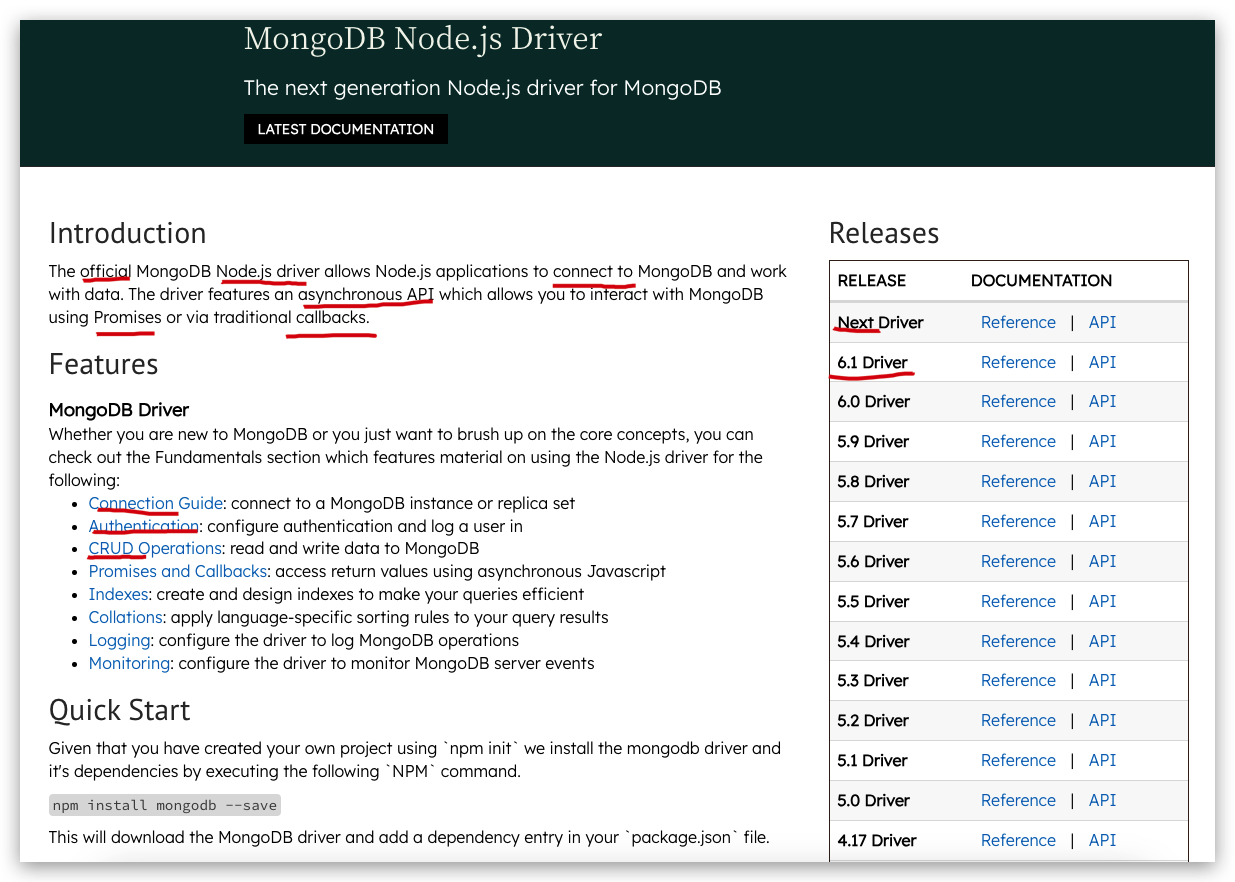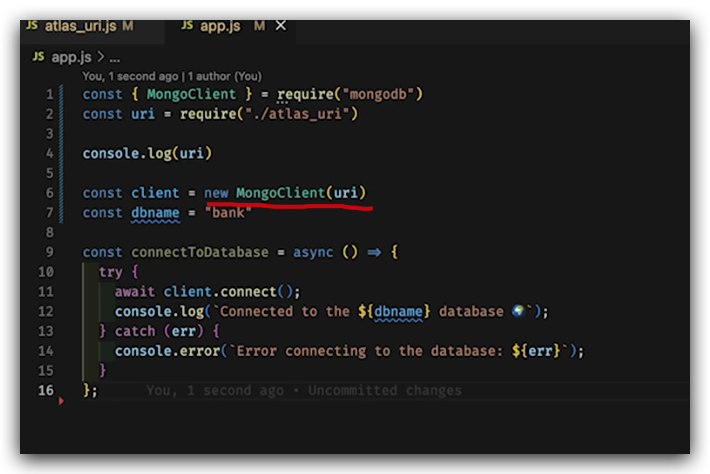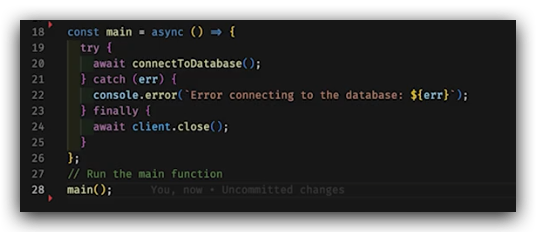MongoDB Node.js Driver and MongoClient All In One
MongoDB Node.js Driver and MongoClient All In One
The next generation Node.js
driverfor MongoDB
$ npm i mongodb
# OR
$ npm i -S mongodb
# OR
$ npm install mongodb --save
https://mongodb.github.io/node-mongodb-native/index.html
https://www.mongodb.com/docs/drivers/node/current/
https://learn.mongodb.com/learning-paths/using-mongodb-with-nodejs
https://mongodb.github.io/node-mongodb-native/Next/

The URL connection format
mongodb://[username:password@]host1[:port1][,host2[:port2],...[,hostN[:portN]]][/[database][?options]]
// new MongoClient
https://mongodb.github.io/node-mongodb-native/api-generated/mongoclient.html
demos
var MongoClient = require('mongodb').MongoClient;
// MongoClient.connect ⚠️ callback function
MongoClient.connect("mongodb://localhost:27017/integration_test", function(err, db) {
test.equal(null, err);
test.ok(db != null);
db.collection("replicaset_mongo_client_collection").update({a:1}, {b:1}, {upsert:true}, function(err, result) {
test.equal(null, err);
test.equal(1, result);
db.close();
test.done();
});
});
var Db = require('mongodb').Db,
MongoClient = require('mongodb').MongoClient,
Server = require('mongodb').Server,
ReplSetServers = require('mongodb').ReplSetServers,
ObjectID = require('mongodb').ObjectID,
Binary = require('mongodb').Binary,
GridStore = require('mongodb').GridStore,
Grid = require('mongodb').Grid,
Code = require('mongodb').Code,
BSON = require('mongodb').pure().BSON,
assert = require('assert');
// Set up the connection to the local db ✅ Promise
var mongoclient = new MongoClient(new Server("localhost", 27017), {native_parser: true});
// Open the connection to the server
mongoclient.open(function(err, mongoclient) {
// Get the first db and do an update document on it
var db = mongoclient.db("integration_tests");
db.collection('mongoclient_test').update({a:1}, {b:1}, {upsert:true}, function(err, result) {
assert.equal(null, err);
assert.equal(1, result);
// Get another db and do an update document on it
var db2 = mongoclient.db("integration_tests2");
db2.collection('mongoclient_test').update({a:1}, {b:1}, {upsert:true}, function(err, result) {
assert.equal(null, err);
assert.equal(1, result);
// Close the connection
mongoclient.close();
});
});
});
(🐞 反爬虫测试!打击盗版⚠️)如果你看到这个信息, 说明这是一篇剽窃的文章,请访问 https://www.cnblogs.com/xgqfrms/ 查看原创文章!
Tutorials
https://learn.mongodb.com/catalog?labels=["Learning Format"]&values=["Learning Path"]
https://learn.mongodb.com/learning-paths/mongodb-nodejs-developer-path
free videos
https://learn.mongodb.com/courses/connecting-to-mongodb-in-nodejs
https://learn.mongodb.com/courses/mongodb-aggregation-with-nodejs
https://learn.mongodb.com/courses/mongodb-crud-operations-in-nodejs
Connecting to an Atlas Cluster in Node.js Applications https://learn.mongodb.com/learn/course/connecting-to-mongodb-in-nodejs/lesson-2-connecting-to-an-atlas-cluster-in-nodejs-applications/first-lesson?client=customer&wvideo=rigink8xd1


const {MongoClient} = require("mongodb");
/*
mongoose 底层依赖于 mongodb
https://www.npmjs.com/package/mongoose
*/
const uri = `mongodb://127.0.0.1:27017/so`;
const client = new MongoClient(uri);
const dbName = `wikis`;
const connectToDatabase = async () => {
try {
await client.connect();
console.log(`${dbName} connect ✅`);
} catch (err) {
console.log(`${dbName} connect ❌`, err);
}
}
const main = async () => {
try {
await connectToDatabase();
console.log(`${dbName} connect ✅`);
} catch (err) {
//
console.log(`${dbName} connect ❌`, err);
} finally {
await client.close();
console.log(`${dbName} close 🎉`);
}
}
main();
refs
https://www.mongodb.com/docs/drivers/node/current/fundamentals/connection/
https://www.mongodb.com/docs/drivers/node/current/fundamentals/authentication/
https://www.mongodb.com/docs/drivers/node/current/fundamentals/crud/
©xgqfrms 2012-2021
www.cnblogs.com/xgqfrms 发布文章使用:只允许注册用户才可以访问!
原创文章,版权所有©️xgqfrms, 禁止转载 🈲️,侵权必究⚠️!
本文首发于博客园,作者:xgqfrms,原文链接:https://www.cnblogs.com/xgqfrms/p/17754405.html
未经授权禁止转载,违者必究!


